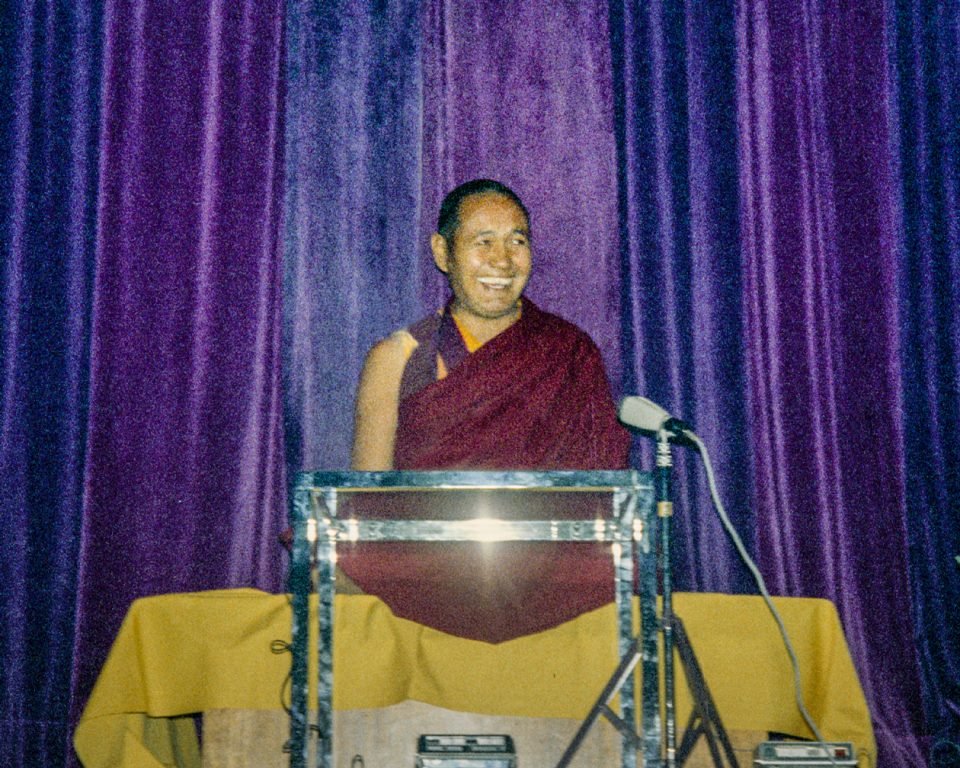When we’re happy, superficially happy, we talk about religion with much energy—“This is great, so good, blah, blah, blah”—discussing all kinds of ideas with great enthusiasm, but the moment something horrible happens, the moment we encounter difficulty, we’ve got nothing. Our mind is completely empty: no understanding, no wisdom, no control. This sort of experience shows how utterly primitive our understanding of religion, Buddhism, Dharma, meditation, or whatever you call it really is.
If you have right understanding and put yourself onto the right path with the right mental attitude, there’s no doubt that you’ll be able to put a definite end to all psychological problems. Therefore, if you want to be a true practitioner of religion, a proper meditator, instead of hallucinating with a mind polluted by theory and ideas, try to develop a clean, clear, realistic understanding and act gradually in the path to liberation. If you do, realizations will definitely come.
If a starving person suddenly gorges himself on rich food, he’ll send his stomach into shock. Instead of benefiting, he’ll just destroy himself. Rather than checking to see what’s best at that particular moment, he just takes the idea “rich food is good for you” and stuffs himself with the best food available. Just because food is good doesn’t mean it’s good for you. It depends on the individual.
Similarly, before you launch into all kinds of spiritual practice, you need to check what’s appropriate for you in your present situation. You need to be aware of your mental problems and lifestyle, examine the many different methods that exist, and then make a conscious decision based on your current situation and what approach suits you at the time. Before you engage in any practice, check to see if it’s really right for you or not.
Practices aren’t good or bad in themselves. A method that’s fantastically good for one person can be poison for another. Something can sound great in theory but turn into poison upon contact with your nervous system; your body, speech, and mind.
If you understand your own mind, you can definitely put it into the right space and gain control over it. With understanding, it’s easy. But if you don’t understand the key, you can’t force it. Control has to come naturally. There’s no such thing as instant mental control.
Therefore, my conclusion is that right mental attitude is much more important than action. Don’t bring your materialistic way of life to your Dharma practice. It doesn’t work. Before meditating, check and correct your motivation. If you do this, your meditation will become much easier and more worthwhile, and your right action will bring realizations. You don’t need to be hungry for realizations, grasping, “Oh, if I do this, will I get some fantastic realizations?” You don’t need expectation; realizations will come automatically. Once you’ve set your mind on the right path, realizations will come of their own accord.
Nor should you grasp at your faith such that if somebody says, “You’re religion is bad,” you angrily turn upon that person. That is totally unrealistic. The purpose of religion is to free you from the agitated, uncontrolled mind. Therefore, if somebody says your religion is bad, why get angry? You should be trying to let go of that kind of mind as much as you possibly can. When you release the deluded mind, inner peace, realizations, nirvana, God, Buddha, Dharma, and Sangha—whatever you want to call it, there are so many names—will automatically be there. It’s a natural thing.
Some people think, “I love religion. It has so many wonderful ideas.” You love the ideas, but if you never relate your religion’s teachings to your mind, never put them into action, what’s the point? You’d be better off with fewer ideas. Too many ideas create conflict within your mind and give you a headache. If all you’re interested in is religious ideas, if you’re all hung up on ideas up there while your life’s going on down here, there’s a big gap between your body, speech, and mind down here on Earth and your big ideas up in the sky. Then, because of the gap, the two things start to bother you: “Oh, now religion’s not so good. My head hurts. I thought religion was fantastic, but now it’s causing me more trouble.” All you can do is complain. But the problem comes from you. Instead of putting two things together, religion and your life, you’ve created a split.
That’s why Lord Buddha called the dualistic mind negative; it always causes mental disturbance. It makes you fight yourself. The mind that reaches beyond duality becomes the buddha mind, ultimate wisdom, absolute consciousness, perfect peace, universal consciousness—there are many things that you can call it.
You can see how your dualistic mind functions in your daily life. Whenever you find something you like, you automatically start looking around to see if there’s anything better. There’s always conflict in your mind: “This is nice, but what about that?” The advertising industry is built on exploiting this universal human tendency and the world of material development has grown exponentially because one mind is always competing with another.









